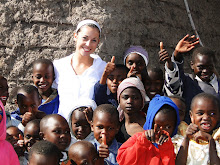




I am feeling much better today. I visited a village today. Africa is really making me feel overwhelmed. People need so much help here. There isn’t even enough water for everyone in the village. Yes, water, a basic staple of life that most, if not all, people reading this use in copious amounts every day. I can’t even quantify how much water I consume every day. I was sitting there listening to a woman tell me that water is a serious problem in the village while I had a huge 1.5 liter bottle of water in my bag. I felt ashamed that I had WATER!
I also noticed/smelled sewage running through this particular village. There were flies everywhere making their home in the filth. The children were all smiling, playing with dirt right near filth and trying to hide from me L. The women in this village were all sitting at stands selling various things, fish, vegetables, hair products, etc. I must say it didn’t look like there was too much economic activity going on, but at least they were trying. The men were playing chess and foosball.
I had the chance to talk to one young girl who was 13. She recently had to drop out of school to work. She explained how hard school had become for her. She had to walk miles to the nearest school and had no money to eat during the day. Lack of food would cause her to be completely exhausted all day, and she found it hard to learn. It finally came time where she just had to stop school to work and help provide for her family. She babysits in the village.
After the village I went to a place on the campus of the public University that the law students created as a study area. This ‘study area’ is actually outside in a wooded area. Many students come to the middle of the woods to study because it is the only quiet place they can find. Imagine that.
My next stop was Kere, a student residence that was just started as an alternative to the public University residences. Foundation SCA is looking to possibly fund this project and its activities for 2010. The residence is a simple apartment that sleeps about 10 girls and is walking distance from the University. They were kind enough to cook dinner for me and talk about their situations. It was so good to have a home cooked meal!
The girls explained their situation prior to having the pleasure of living in Kere. Many of them had to get up at about 5am to be at school by 9am. They don’t live close to Abidjan and the buses are often late, unreliable, full, and the traffic can be terrible. Four girls, Bertine, Bertina, Rose, and Vicki all had these similar stories. When they started their University studies they commuted from their homes. After realizing that getting up at 5am, not being able to afford to eat all day because they needed transportation money, waiting hours to fit onto a bus home, and finally walking in the door around 10pm was not allowing time or energy for study, they looked for an alternative.
[Sidenote: there are very few buses and people literally fight to fit onto the bus. The bus stops are packed and students often wait for hours to get on the bus and are even forced to sleep on the University campus because they don’t fit on the last bus]
Their alternative was usually living with a distant relative or family friend who was somewhat closer to the University. As I explained before, this living situation is not ideal either. These girls can now walk to school and save their money for FOOD to fuel their minds during the day. They have a peaceful place to live where they can help each other with studying and schoolwork. They kept telling me how much they all felt like a family.
Bertina described her brief stay in the public University residences. She shared a tiny room with 2 other girls. She said it was impossible to live in this environment, much less study. She would try to buy food to eat during the week and people would just take it out of her room and eat it without asking. Parties were going on at all hours of the night, electricity was a rare luxury, etc...I think you get the idea.
I never realized how much I took the facilities at my College for granted. I can’t imagine nt having anywhere but the woods to study. This is no exaggeration either; I have seen it with my own eyes.
The girls were so wonderful though. After a delicious meal they asked me questions. The one girl was cracking me up with her questions. She kept asking me about ridiculous things she had seen on tv. She said she saw a show about cheerleaders and was really curious as to how 'cool' they were in high school. I assured her that cheerleaders were NOT that cool. (haha sorry I went to an all girls high school.. so biased) I also told them about my college living situation, which they found to be amazing. Although I have found it difficult sharing my experiences with the women I have met, I think it is important that they know that the state of their country is unacceptable, and they should demand higher standards. It has been hard to find a balance between conveying 'this is what you should be demanding' as opposed to 'haha look what the US has and you don't, you should just move here'. I think I have found a good balance.
We sang and danced after dinner. The girls even prepared a rendition of Alica Keys’ song ‘No One’ for me. They were good!! I was sad to leave them and wish I could’ve spent more time talking with these strong and determined young women.






































